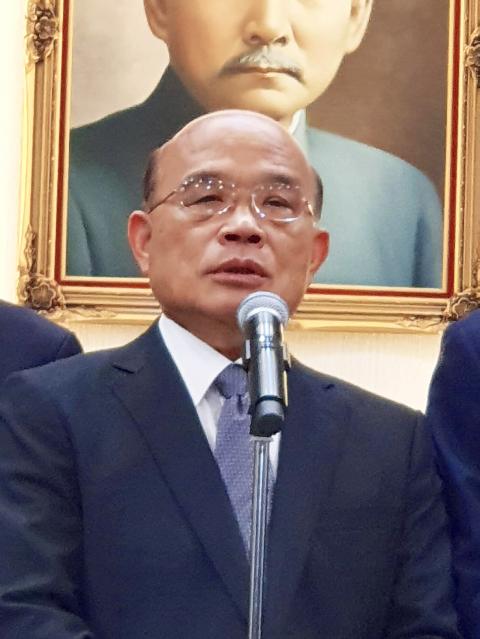The Executive Yuan today is expected to approve draft amendments to the Foreign Trade Act (貿易法) aimed at preventing companies from shipping China-made products to Taiwan to receive a “Made in Taiwan” (MIT) certificate of origin, an anonymous source said.
The amendments were published last month by the Bureau of Foreign Trade amid an ongoing US-China trade dispute.
To evade US tariffs on Chinese goods, a number of products from China destined for the US have been found making stopovers in Taiwan to gain an MIT label to conceal their source, the Ministry of Economic Affairs said last month.

Photo: Lee Hsin-fang, Taipei Times
Under the amendments, firms found guilty of illegally exporting “strategic high-tech goods” to non-restricted regions, applying and using false certificates of origin, illegally transferring goods, labeling false countries of origin or disturbing trade through undue means would face a fine of NT$60,000 to NT$3 million (US$1,929 to US$96,432), up from NT$30,000 to NT$300,000.
The amendments would also introduce a system to reward people who report breaches, which would prevent false labels from prompting foreign inspections of Taiwanese firms, and affecting the overall interests and reputation of domestic industries, the source said.
The act has not been amended in 10 years, they added.
Domestic businesses have said that the current fines are not high enough to prevent firms from illegally changing their products’ country of origin, they said.
The bureau last year began requiring stricter management of certain goods, including solar power products, bicycles, and metal screws and nuts.
It previously found that solar photovoltaic products made in China and exported to Taiwan had been labeled as being from Vietnam, the source said, adding that it now requires to see certificates of origin when goods are imported to Taiwan.
The bureau has also established a monitoring system for bicycle parts, about which domestic businesses have expressed concern, they said.
If the prices of the imports are too low, the bureau would look into the matter through the industry’s association and customs, they added.
Since last year, the bureau has been cooperating with customs to remind businesses that goods on which the US has raised tariffs need to fulfill the MIT requirements to receive an MIT certificate of origin, they said.
To receive a certificate, the goods would need to have increased in value by 35 percent from when they were imported to when they were processed and exported, they added.

A car bomb killed a senior Russian general in southern Moscow yesterday morning, the latest high-profile army figure to be blown up in a blast that came just hours after Russian and Ukrainian delegates held separate talks in Miami on a plan to end the war. Kyiv has not commented on the incident, but Russian investigators said they were probing whether the blast was “linked” to “Ukrainian special forces.” The attack was similar to other assassinations of generals and pro-war figures that have either been claimed, or are widely believed to have been orchestrated, by Ukraine. Russian Lieutenant General Fanil Sarvarov, 56, head

SAFETY FIRST: Double the number of police were deployed at the Taipei Marathon, while other cities released plans to bolster public event safety Authorities across Taiwan have stepped up security measures ahead of Christmas and New Year events, following a knife and smoke bomb attack in Taipei on Friday that left four people dead and 11 injured. In a bid to prevent potential copycat incidents, police deployments have been expanded for large gatherings, transport hubs, and other crowded public spaces, according to official statements from police and city authorities. Taipei Mayor Chiang Wan-an (蔣萬安) said the city has “comprehensively raised security readiness” in crowded areas, increased police deployments with armed officers, and intensified patrols during weekends and nighttime hours. For large-scale events, security checkpoints and explosives

PUBLIC SAFETY: The premier said that security would be tightened in transport hubs, while President Lai commended the public for their bravery The government is to deploy more police, including rapid response units, in crowded public areas to ensure a swift response to any threats, President William Lai (賴清德) said yesterday after a knife attack killed three people and injured 11 in Taipei the previous day. Lai made the remarks following a briefing by the National Police Agency on the progress of the investigation, saying that the attack underscored the importance of cooperation in public security between the central and local governments. The attack unfolded in the early evening on Friday around Taipei Main Station’s M7 exit and later near the Taipei MRT’s Zhongshan

REBUFFED: In response to Chinese criticism over recent arms sales, Washington urged Beijing to engage in meaningful dialogue instead of threats and intimidation Washington’s long-term commitment to Taiwan would not change, the US Department of State said yesterday, urging Beijing to stop pressuring Taiwan and engage in meaningful bilateral dialogues. The remarks came in response to a backlash from Beijing about Washington’s latest approval of arms sales to Taiwan. The US Defense Security Cooperation Agency said in a statement on Wednesday that the Taipei Economic and Cultural Representative Office in the US has asked to purchase an arms package, including Tactical Mission Network Software; AH-1W helicopter spare and repair parts; M109A7 self-propelled howitzers; HIMARS long range precision strike systems; tube-launched, optically tracked, wire-guided missiles; Javelin